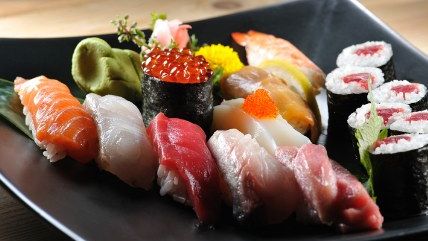Does Classifying Food as 'Healthy' or 'Unhealthy' Miss the Point?
A handful of experts weigh in on a survey of nutritionist and consumer perceptions.


Is orange juice healthy? Unhealthy? What about butter, steak, hamburgers, turkey, bacon, beer, wine, soda, wheat bread, white bread, peanut butter, and coconut oil?
Earlier this week, the New York Times's Upshot blog released the results of a survey of consumers and nutritionists that asked about their respective perceptions of whether dozens of foods are healthy or unhealthy. Those perceptions often differ markedly. And it's not clear whose opinions, if anyone's, is "right"—or even if there's such thing as a right answer.
"Unfortunately," Upshot writers Kevin Quealy and Margot Sanger-Katz conclude, "the answer is anything but simple."
The study's results are, in many cases, an eye opener. Ninety percent of nutritionists say cottage cheese is healthy, but only around fifty-five percent say the same of cheddar cheese. An overwhelming majority of consumers and nutritionists agreed that hamburgers aren't healthy, but that steak is.
"No food elicited a greater difference of opinion between experts and the public than granola bars," write Quealy and Sanger-Katz. "About 70 percent of Americans called it healthy, but less than 30 percent of nutritionists did."
Fascinated by the study—at a time when more and more government bodies seek to write rules based on what foods they believe are or are not objectively "healthy"—I asked a diverse handful of experts from various food-related fields to respond to four questions about the quality of the survey, any surprises they saw in the responses of those surveyed, and the overall lessons they feel the survey conveys.
The respondents are:
- Edward Archer, Ph.D., obesity theorist and Chief Science Officer for EnduringFX
- Dr. Joy Dubost, dietitian, Washington, D.C.
- Michael Greger, M.D., Director, Public Health and Animal Agriculture, Humane Society of the United States
- Julie Kelly, National Review Online contributor and food/agricultural writer, Orland Park, Ill.
- Pete Kennedy, Esq., attorney, Farm-to-Consumer Legal Defense Fund
Mostly, as their comments below demonstrate, it appears that there's at least as wide a gulf between the experts I surveyed as there is between the consumers and nutritionists surveyed by the New York Times.
Edward Archer, Ph.D., obesity theorist and Chief Science Officer for EnduringFX
1) What is your overall opinion about the results? What, if anything, does the study get right/wrong?
The study is based on a false dichotomy and a flawed narrative. We are not what we eat. Our health is the confluence of our inherited physiologic properties (e.g., our metabolism) and our behaviors. Therefore, 'health" is a property of the person and not an inherent property of foods and beverages.
2) On which foods (if any) do you side with consumers rather than nutritionists?
The dichotomy of "healthy" vs. "unhealthy" is unscientific. For example, how would you save a starving child? Would you feed him or her a "root-beer float" (i.e., a sugar-sweetened beverage and ice cream), or a "healthy" meal of organic carrots, quinoa, and kale? If you answered the root-beer float, you would save the child's life. If fed the "healthy" diet, the child would starve due to a lack of protein and/or energy.
3) On which foods (if any) do you side with nutritionists rather than consumers?
As long as the foods or beverages on the study's list do not contain large amounts of pathogens and are consumed by a healthy person, everything on the list is safe to eat. But be careful not to conflate "safe to eat" with "healthy." These terms are not synonymous.
4) What broad trend(s) or idea(s), if any, do you identify in the study results?
The false dichotomy and flawed narrative upon which the study was based demonstrates the scientific illiteracy of the persistent myth "we are what we eat," and the erroneous notion that we can diet our way out of a sedentary lifestyle.
Dr. Joy Dubost, dietitian, Washington, D.C.
1) What is your overall opinion about the results? What, if anything, does the study get right/wrong?
The results are interesting but what was the point of the survey and does this create more confusion on nutrition? I tend to focus more on overall healthy diets rather than force fitting specific foods into what is essentially being classified as "good" or "bad" foods. Interesting to note at the end of the article the nutritionists note there is "no special rules or restrictions" for diets. If this is truly the case why classify the foods if all foods fit into a diet?
2) On which foods (if any) do you side with consumers rather than nutritionists?
Sushi. This is one of those cases that it is a "broad" category and can become dependent on what comes with the fish, particularly within a roll. I would suspect one can argue sashimi is healthy, but I would be hesitant to state that all sushi is healthy. Wine. The research indicates any potential benefits from moderate consumption of alcohol are directly related to the ethanol content, which includes beer, wine and spirits.
3) On which foods (if any) do you side with nutritionists rather than consumers?
Coconut oil. Emerging evidence indicates that not all saturated fat is created equal and thus has the same detrimental effects. However at this point, I would be hesitant to recommend using coconut oil versus other oils that contain higher amounts of mono and polyunsaturated oils.
4) What broad trend(s) or idea(s), if any, do you identify in the study results?
Much of this depends on the trends within restaurants and retail, as well as media headlines a particular food may receive. The more consumers are inundated with headlines and popular opinion on a specific food, the more their own opinion is shaped regardless of where the science stands.
Michael Greger, M.D., Director, Public Health and Animal Agriculture, Humane Society of the United States
1) What is your overall opinion about the results? What, if anything, does the study get right/wrong?
Well, the premise of this comparison appears to me to have a serious flaw. The "experts" are called nutritionists, but "nutritionist" is one of the few titles which [does] not require any formal training, certification, or degree. So the difference between the public and the nutritionists, is that the nutritionists self-identify as such (not that the nutritionists actually have any more training than the public).
2) On which foods (if any) do you side with consumers rather than nutritionists?
Consumers are correct on granola. While most processed granola bars would not make the cut (based on the 5:1 carb:fiber rule) However, the largest nutrition population studies in the world associate the consumption of whole food plant-based foods (such as granola bars when made from foods like whole grains, dried fruits, nuts, and seeds) with health and longevity.
3) On which foods (if any) do you side with nutritionists rather than consumers?
Around the world, the longest lived people are those who eat beans every day-whether it's the Japanese eating soy, the Swedes eating brown beans and peas, or those in the Mediterranean eating white beans, lentils, and chickpeas. Did you know 2 tablespoons of beans a day is associated with an 8% reduction in the risk of premature death? So the research says: hummus for the win!
4) What broad trend(s) or idea(s), if any, do you identify in the study results?
Despite the fact that global fast food revenues last year were $570 billion, it does appear that everyone polled now realizes that processed foods, and foods that contain saturated fat, cholesterol, added sugar or salt cannot be called healthy. So now we just need to align what we know with what we actually consume (and what businesses we support with our consumer dollars).
Julie Kelly, National Review Online contributor and food/agricultural writer, Orland Park, Ill.
1) What is your overall opinion about the results? What, if anything, does the study get right/wrong?
It's interesting to gauge the opinion of the two different groups, but whether a food is "healthy" or not is mostly subjective. What might be healthy for a teenage athlete (protein, fat, sodium, etc.) might not be the right diet for an overweight middle-age man trying to lose weight. I've said that I think we are making a big mistake, for example in school nutrition programs, applying adult diets to children or teens. What's healthy for one age group/gender might not be for another.
2) On which foods (if any) do you side with consumers rather than nutritionists?
None. I can't believe anyone would think a Slim Fast shake is "healthy."
3) On which foods (if any) do you side with nutritionists rather than consumers?
Wine for sure, not just some physical health benefits but moms around the world depend on this elixir for mental health. Hummus is good as long as it's not too doctored up with other ingredients. Tofu should be outlawed.
4) What broad trend(s) or idea(s), if any, do you identify in the study results?
Overall, I think people are starting to embrace fat again, not just as science disproves a correlation between animal fat and some diseases, but because its more satisfying and filling. When I taught cooking classes, most of the moms were shocked I used whole dairy products and butter. Food tastes better, you are less hungry during the day and there may be some health benefits as well.
Pete Kennedy, Esq., attorney, Farm-to-Consumer Legal Defense Fund
1) What is your overall opinion about the results? What, if anything, does the study get right/wrong?
The results are not something that anyone should adopt as their own personal dietary guideline. The study underestimates the nutritional value of red meat; also it does not distinguish between raw and pasteurized dairy--they are different food categories. Tofu is NOT a health food. I agree with eggs being rated nutritious by both groups.
2) On which foods (if any) do you side with consumers rather than nutritionists?
I side with consumers on the nutritional value of coconut oil and on the lack of nutritional value of tofu.
3) On which foods (if any) do you side with nutritionists rather than consumers?
I side with the nutritionists on the nutritional value of shrimp and I agree on the lack of nutritional value of the SlimFast shake and American cheese.
4) What broad trend(s) or idea(s), if any, do you identify in the study results?
I notice there's still an unfounded fear of higher cholesterol foods such as meat and dairy. The overall belief that carbohydrates are healthier than fats remains. Unfortunately, it seems that the dietary pyramid that the pharmaceutical companies have funded over the years still has too much influence.


Show Comments (306)